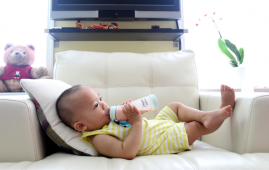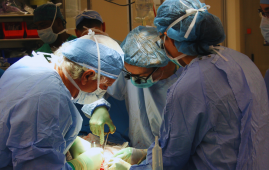

In December 2019 a new coronavirus (CoV) emerged as a human pathogen, SARS-CoV-2. There are few data on human coronavirus infections among individuals living with HIV. In this study, we probed the role of pneumococcal coinfections with seasonal CoVs among children living with and without HIV hospitalized for pneumonia. We also described the prevalence and clinical manifestations of these infections. A total of 39,836 children who participated in a randomized, double-blind, placebo-controlled clinical trial on the efficacy of a 9-valent pneumococcal conjugate vaccine (PCV9) were followed for lower respiratory tract infection hospitalizations until 2 years of age. Nasopharyngeal aspirates were collected at the time of hospitalization and were screened by PCR for four seasonal CoVs. The frequency of CoV-associated pneumonia was higher in children living with HIV (19.9%) than in those without HIV (7.6%, P < 0.001). Serial CoV infections were detected in children living with HIV. The case fatality risk among children with CoV-associated pneumonia was higher in those living with HIV (30.4%) than without HIV (2.9%, P = 0.001). C-reactive protein and procalcitonin levels were elevated in 36.8% (≥40 mg/liter) and 64.7% (≥0.5 ng/ml), respectively, of the fatal cases living with HIV. Among children without HIV, there was a 64.0% (95% CI: 22.9% to 83.2%) lower incidence of CoV-associated pneumonia hospitalizations among PCV9 recipients compared to placebo recipients. These data suggest that Streptococcus pneumoniae infections might have a role in the development of pneumonia associated with endemic CoVs, that PCV may prevent pediatric CoV-associated hospitalization, and that children living with HIV with CoV infections develop more severe outcomes.
IMPORTANCE SARS-CoV-2 may cause severe hospitalization, but little is known about the role of secondary bacterial infection in these severe cases, beyond the observation of high levels of reported inflammatory markers, associated with the bacterial infection, such as procalcitonin. We did a secondary analysis of a double-blind randomized trial of PCV to examine its impact on human CoV infections before the pandemic. We found that both children living with and without HIV randomized to receive PCV had evidence of less hospitalization due to seasonal CoV, suggesting that pneumococcal coinfection may play a role in severe hospitalized CoV infections.
more recommended stories
 Safer Allogeneic Stem Cell Transplants with Treg Therapy
Safer Allogeneic Stem Cell Transplants with Treg TherapyA new preclinical study from the.
 Autoimmune Disorders: ADA2 as a Therapeutic Target
Autoimmune Disorders: ADA2 as a Therapeutic TargetAdenosine deaminase 2 (ADA2) has emerged.
 Kaempferol: A Breakthrough in Allergy Management
Kaempferol: A Breakthrough in Allergy ManagementKaempferol, a dietary flavonoid found in.
 Early Milk Cereal Drinks May Spur Infant Weight Gain
Early Milk Cereal Drinks May Spur Infant Weight GainNew research published in Acta Paediatrica.
 TaVNS: A Breakthrough for Chronic Insomnia Treatment
TaVNS: A Breakthrough for Chronic Insomnia TreatmentA recent study conducted by the.
 First-of-Its-Kind Gene-Edited Pig Kidney: Towana’s New Life
First-of-Its-Kind Gene-Edited Pig Kidney: Towana’s New LifeSurgeons at NYU Langone Health have.
 Just-in-Time Training Improves Success & Patient Safety
Just-in-Time Training Improves Success & Patient SafetyA study published in The BMJ.
 ChatGPT Excels in Medical Summaries, Lacks Field-Specific Relevance
ChatGPT Excels in Medical Summaries, Lacks Field-Specific RelevanceIn a recent study published in.
 Study finds automated decision minimizes high-risk medicine combinations in ICU patients
Study finds automated decision minimizes high-risk medicine combinations in ICU patientsA multicenter study coordinated by Amsterdam.
 Study Discovers Connection Between Omicron Infection and Brain Structure Changes in Men
Study Discovers Connection Between Omicron Infection and Brain Structure Changes in MenA recent study in the JAMA.

Leave a Comment